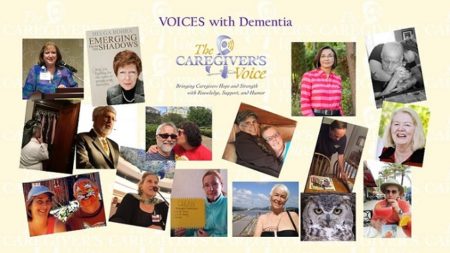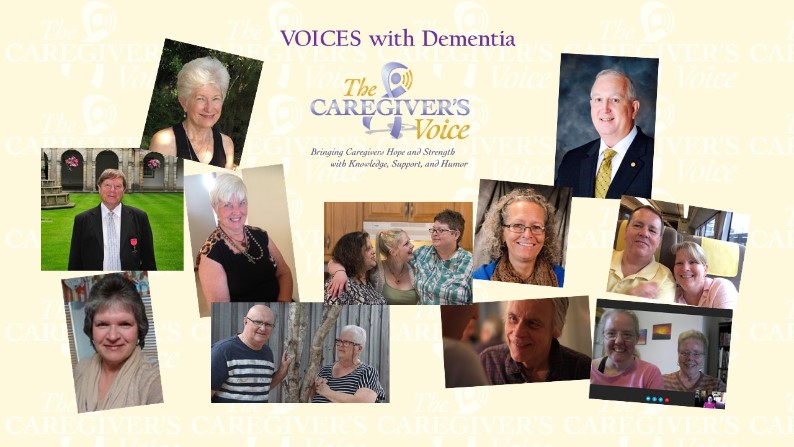Touching Each Other’s and Caregivers’ Lives
As we close out the third year of featuring one voice every month in the VOICES with Dementia column, we are humbled by some unexpected outcomes. Our initial goal was to inform and inspire caregivers with what it’s like to live with dementia. We figured, we’d also help raise awareness and reduce the stigma.
Unexpected Outcomes
From the initial invitation through the subsequent interview and publication in the VOICES with Dementia column, we learned we’re helping people with dementia reach a wider audience with their stories; especially, caregivers. One mentioned waiting two years for an organization to share her story. (It took us two months.) Others feel affirmed when genuinely understood by someone outside their inner circle. They “feel respected.” One added, “You empower us to continue our advocacy and to speak on behalf of those who can no longer speak for themselves.”
Each person with dementia reminds us of what’s important in life – a deeply heartfelt connection with another human being. When one is diagnosed with an incurable disease, life becomes more focused and is lived more urgently, leaving little room for minutiae.
The image below is a collage of the 11 VOICES with Dementia in 2017. Click on the featured person’s name below to read more.
What We’ve Learned from People with Dementia
Dementia is unpredictable.
Nancy Nelson still drives on the familiar roads close to her home in Las Vegas, but there are times she gets disoriented. She’ll pull over to calm herself and get reoriented. After being diagnosed with younger-onset Alzheimer’s, she discovered and honed her talent as a published poet of two poignant books of insights into life with dementia.
Mick Carmody was misdiagnosed with epilepsy before being diagnosed with fronto-temporal lobe dementia (FTD). He suffered both seizures and an aneurism. He and his caregiver wife recently moved into nursing care after both of their health needs made it a safer option. Before this, he selflessly served Dementia Alliance International (DAI) as their Global Support Group Manager, arranging for and even hosting support groups for people with dementia. He was recognized with the first DAI Richard Taylor Advocates Award.
Lyn Purser was born four months premature and placed on antibiotics, which likely compounded her life challenges. At age 14, she went through a period of having seizures, which were inadequately controlled with medication. At only 39, she was diagnosed with younger-onset Alzheimer’s disease. She’s since become an in-demand artist whose paintings sell quickly.
Mary Beth Wighton wants to continue helping shape policy in Canada for the rights of people with dementia. She admits it’s hard keeping people on the board of Ontario Dementia Advisory Group (ODAG) or even finding volunteers. As the disease progresses, people may get offended easier due to unpredictable dementia symptoms or no longer have the capacity to serve. “We have to be careful that we don’t act out, so we can work together.”
Doctors still show insensitivity when giving the diagnosis.
People remember every detail of receiving their diagnosis with dementia. Doctors often leave patients with a sense of hopelessness. Instead of an off-putting remark or ignoring the patient altogether, doctors can show a lot more compassion and offer referrals for follow-on care, rehabilitation, and support.
Former ICU nurse, Phyllis Fehr, was fuming after returning a year later to the gerontologist who then turned to her husband and said, “Yes, she has Alzheimer’s. She can still dress herself, so bring her back when she can’t.”
John Sandblom had an epiphany. (Research shows that before people are diagnosed, they often have a compelling sense that something may be wrong.) When he stopped being able to multi-task with ease, he went to the doctor, who laughed at his concern. He then went to a psychiatrist who dismissed him with a diagnosis of depression. Next, he saw a doctor who ordered a full battery of tests. When a year passed and his symptoms didn’t match the doctor’s diagnosis of FTD, he returned. The doctor became angry with him.
Engaging. Sensitive. Funny.
Scotsman, James McKillop, was having mini-strokes (TIAs) in multiple areas of his brain. He was diagnosed with multi-infarct dementia. Life since has included a few humbling encounters that this man with an honorary doctorate degree and an MBE (the Most Excellent Order of the British Empire) presented by the Queen of England, reflects on with a sense of humor.
Val Schache is kind, engaging, and informed. She eagerly shares information with all who ask. Sometimes, it’s hard to keep up, but she does make us laugh. She used to share “Valerisms.” Today, her wisdom comes in the form of “Valzheimers”.
From Diverse Walks of Life
Dementia is not choosy. It steals bits and pieces from people of all walks of life, like the voice of former special education teacher, Michael O’Brien. Diagnosed nine years ago with younger onset FTD at age 60, his sons produced a mini-documentary called, Mentia, to give caregiving families a glimpse of caring for one with dementia.
Tracy Mobley grew up working on a Missouri farm before serving as a surgical technician. After getting lost wheeling patients to their recovery rooms or forgetting what the operating room doctor requested, she was diagnosed with younger-onset Alzheimer’s at age 38. Then she received a diagnosis of FTD. Years later, she was diagnosed with brain damage due to spousal abuse, which caused seizures.
Robert Bowles served as an independent pharmacist for 42 years before health problems lead to his selling his business. He saw eight physicians over an 18-month period who gave him almost as many diagnoses. Beginning with stress due to overwork, depression, and then mild cognitive impairment, Lewy body dementia (LBD), and even Parkinson’s and FTD, he finally received the diagnosis that best fit with his symptoms – LBD.
Social media serves as a virtual lifeline of support.
Most of the 11 VOICES with Dementia featured above have used or still actively use social media. From private Facebook groups, where people with dementia can find support, to caregivers sharing their experiences online. By sharing, they inspire one another. One person takes an initiative, encouraging others to do the same.
Thank you, Nancy, Robert, Kevin and Conner for your dad Michael, Carole for Tracy, Mick, Lyn’s Sister and Mom with Lyn, John, Phyllis, Val, Mary Beth, and James for agreeing to be interviewed and sharing your stories.
 Read the Top 10 things we learned from the beginning of our feature program through December of last year at: The Caregiver’s Voice Reflects on the Voices with Dementia
Read the Top 10 things we learned from the beginning of our feature program through December of last year at: The Caregiver’s Voice Reflects on the Voices with Dementia
For a retrospective, read about how we began: The Caregiver’s Voice will be launching a new column called VOICES with Dementia.
















Phyllis Fehr, one of the featured VOICES with dementia shares this personal experience at the grocery store and draws an analogy with two physical disabilities.
Read about her experience at the meat counter here:
I am a Person with Dementia and a Person with Rights.
http://alzheimersocietyblog.ca/person-dementia-rights-part-one/
Hey Brenda!
Thank you for sharing such a heartfelt article. My grandmother has dementia and I know how challenging it can be. Your article is surely a big help and inspiration for families and seniors.
Ariel, thank you for writing.
Please share with the families you serve who may also be helped with greater awareness.
Brenda
We’re proud to be able to share these stories in their own words at VOICES with Dementia. Building on the work of Gary Joseph LeBlanc and Dementia Mentors and tapping Dementia Alliance International‘s members, as caregivers we’re learning more to better provide care.